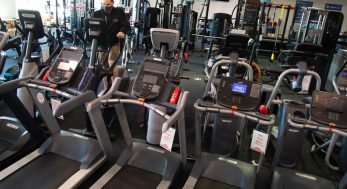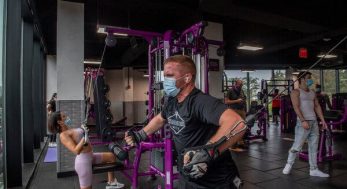Here’s everything you need to know about selecting a workout face mask, plus six of the best options.
Each product we feature has been independently selected and reviewed by our editorial team. If you make a purchase using the links included, we may earn commission.
Wearing a face mask for everyday activities takes some adjusting, even if it’s just to make a quick grocery run. So if your breathing starts to get heavier during a set of jump squats, there’s a good chance you’ll feel the urge to rip it right off.
Unfortunately, gyms are notorious for germ spread and tend to fill up with people, so they’re one of the environments where widespread mask-wearing could really pay off. If your gym has reopened and you want to feel as comfortable as possible while working out in a face mask, here’s everything you should know. (Related: Should You Wear a Face Mask for Outdoor Runs During the Coronavirus Pandemic?)
Is It Safe to Wear a Face Mask While Working Out?
At this point, the Centers for Disease Control and Prevention (CDC) currently recommends wearing non-medical face masks “in public settings and when around people who don’t live in your household, especially when other social distancing measures are difficult to maintain.” So if you’re going for an outdoor run where you won’t be near other people, you don’t need to keep a mask on. Visiting a gym or studio or working out close to others is more likely to make that physical distancing unlikely.
Thus far, there hasn’t been much research on the effects of wearing cloth masks while exercising. Some experts believe their effect on oxygen/carbon dioxide exchange might present problems during workouts. “Exercise, especially strenuous exercise, while wearing a face mask can have physiological consequences,” says Nina Mausek, M.Sc., Ph.D., geneticist and chief scientist for PN Medical, a company that conducts research on and makes cardiopulmonary devices. “Changes in the breathing pattern can cause imbalances in the O₂/CO₂ gas exchange, leading to either too low levels of carbon dioxide (hypocapnia) or higher than normal levels of carbon dioxide (hypercapnia) [in the blood].” That can affect oxygen consumption and delivery to muscles and the brain, she says. “Due to these physiological events, wearing a face mask during exercise may cause fatigue, headaches, shortness of breath, and muscle weakness,” she says. (Note: This is a wholly different situation from wearing an altitude training mask.)
If you’re going to wear a mask while exercising, Dr. Mausek suggests taking five quality breaths before putting it on, right after putting it on, then after taking it off, to promote a good breathing pattern during your workout. (And maybe consider saving intense HIIT workouts for occasions when you don’t need to wear a mask.)
However, the consensus among health experts is that cloth masks probably aren’t tightly-woven enough to lead to an unhealthy CO2 buildup. “The CO2 will slowly build up in the mask over time,” a representative for the CDC told Reuters in regards to cloth face mask wear in general. “However, the level of CO2 likely to build up in the mask is mostly tolerable to people exposed to it. You might get a headache but you most likely [would] not suffer the symptoms observed at much higher levels of CO2. The mask can become uncomfortable for a variety of reasons including sensitivity to CO2 and the person will be motivated to remove the mask. It is unlikely that wearing a mask will cause hypercapnia.” Translation: Most people won’t experience serious symptoms from wearing a cloth face mask.
Gyms and studios reopening across the country have approached the face mask dilemma differently—some require patrons to wear face masks while others are face mask-optional. Some ask that patrons wear a mask when not engaging in high-intensity work. Fortunately, if you are required to wear a mask or just want to wear one out of consideration, there are plenty of options that are designed to be more comfortable for exercise.
How to Choose a Workout Face Mask
There’s always a tradeoff involved when it comes to shopping for face masks for everyday use. The more tightly-woven a mask’s fabric is, the more effective it will be, but the harder it will be to breathe in. (That’s because smaller holes between fibers make it harder for air and particles to pass through.) Cotton face masks have become a popular choice for everyday use since the material strikes a balance between breathability and the ability to trap respiratory droplets.
When you’re exercising, you might want to go even more breathable than you would otherwise. “Unfortunately, we do not have scientific evidence to support this, but it seems practical to choose fabric that is light, breathable, and moisture-wicking when choosing a face mask to work out in,” says Christa van Rensburg, M.D., Ph.D., sport and exercise physician, rheumatologist, and head of sports medicine at the University of Pretoria in South Africa. “Currently the most versatile pick is a mask made with a lightweight blend of spandex—which gives a bit of stretch—and polyester that’s sweat-wicking and breathable. Lighter cotton, polyesters, or performance fabrics are also acceptable and safe to use.”
There’s also a give and take when it comes to fit. “To be effective, a mask needs a tight seal around the nose and mouth, but that will decrease effective airflow and breathing,” says Dr. van Rensburg. “The best is to choose a mask that fits tightly, but still allows for comfortable breathing. It might take trial and error.” For the same reason, masks that are designed with an interior structure that prevents them from collapsing on your nose and mouth may feel more comfortable, she says. (Related: Should You Buy a Copper Fabric Face Mask to Protect Against COVID-19?)
When shopping for face masks, you may come across masks with small valves on the front. They allow for easier exhalation, but they still aren’t ideal, says Dr. van Rensburg. “The problem is that they only filter inhaled breath and not exhaled breath. A vented mask will thus work for the wearer as it is more comfortable, but it, unfortunately, won’t contain their droplets.”
Workout-friendly face masks aren’t hard to come by. Major activewear brands have started to come out with masks intended specifically for running or training. Under Armour recently launched its Sportsmask (Buy It, $30, underarmour.com), which sold out in an hour. It’s designed to address some of the major downsides of working out in face masks. “The Under Armour Sportsmask is structured to sit up and off your face, which makes breathing and talking easier. It doesn’t move in and out as you breathe as cloth masks can,” says Cara McDonough, vice president of accessories and licensing at Under Armour. “Also, moisture-wicking fabric moves sweat to an inner layer so that sweat doesn’t build up on the mask in front of the nose and mouth, which might limit breathability.” (Related: This Face Mask Is So Breathable During Workouts, My BF Keeps Stealing Mine to Go Running)
Designers at Reebok have also created three futuristic face masks designs. They’re purely conceptual, but they might inform future face mask designs, with features like a clear panel that reveals facial expressions and fitness app integrations. For now, the brand offers three-packs of breathable, recycled polyester face masks (Buy It, $20, reebok.com).
There are already plenty of lightweight, breathable masks to choose from, and activewear companies are no doubt continuing to focus on creating workout-friendly masks. Keep scrolling to see more options below.
Left: Reebok
Center: Reebok
Right: Reebok
The Best Light, Breathable Face Masks for Working Out
Now that you know what to look for when you’re shopping for a workout face mask, here are some of the best options to get you started.
Reebok Face Covers 3-Pack
Reebok
Buy It: Reebok Face Covers 3-Pack, $20, reebok.com
Under Armour Sportsmask
Under Amour
Buy It: Under Armour Sportsmask, $30, underarmour.com
BlackStrap Sustainable Antimicrobial Advanced Civil Face Mask
Onzie Mindful Masks
Buy It: Onzie Mindful Masks, $24, onzie.com
Maaji Calm 5 Pack Face Covering
Shopbop
Buy It: Maaji Calm 5 Pack Face Covering, $32, shopbop.com
Hanes Signature Stretch-to-Fit Masks 6-Pack
Buy It: Hanes Signature Stretch-To-Fit Masks 6-Pack, $20, hanes.com
The information in this story is accurate as of press time. As updates about coronavirus COVID-19 continue to evolve, it’s possible that some information and recommendations in this story have changed since initial publication. We encourage you to check in regularly with resources such as the CDC, the WHO, and your local public health department for the most up-to-date data and recommendations.


